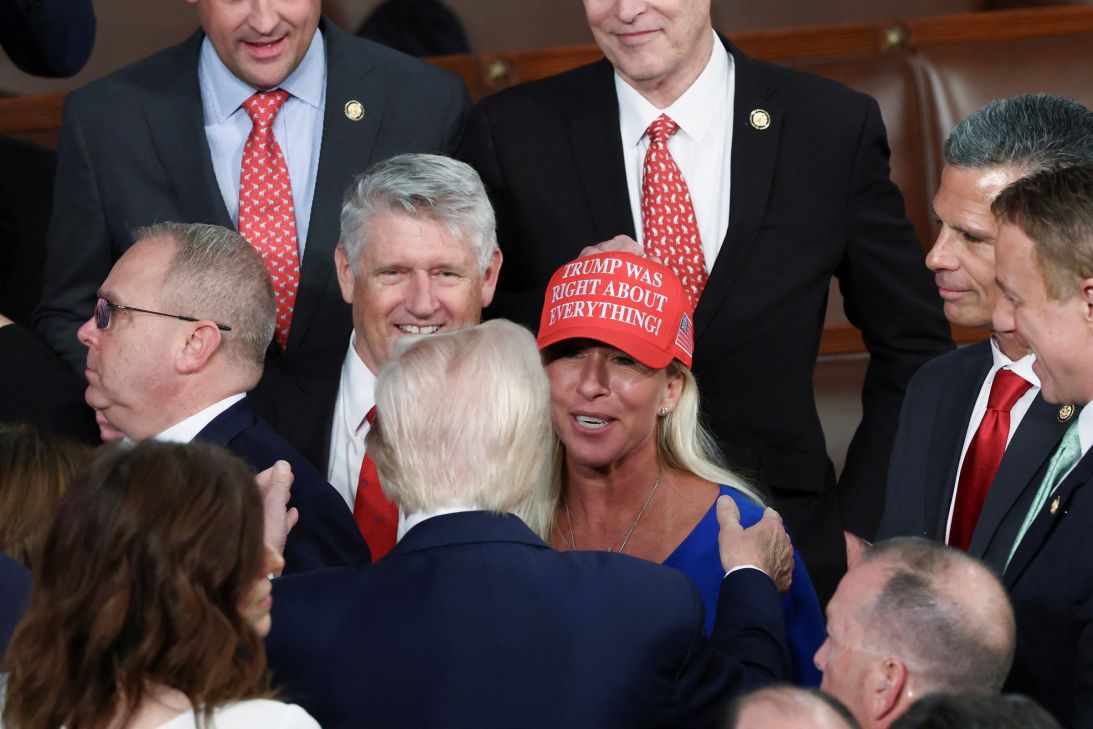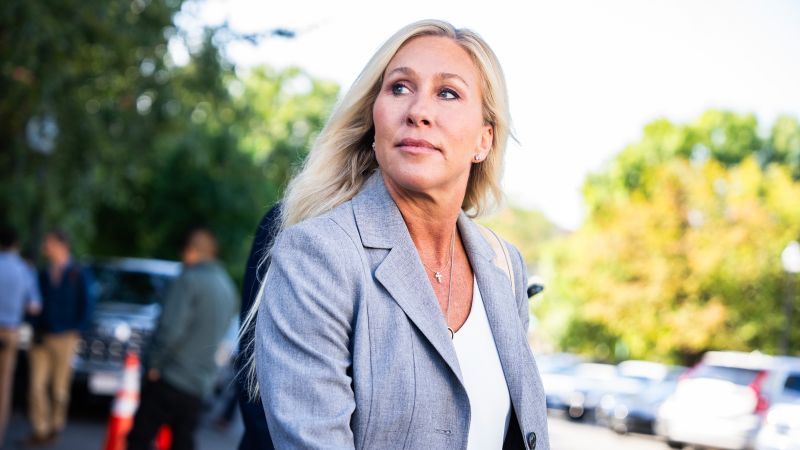Marjorie Taylor Greene did something politicians almost never do: She said she was sorry.
The Georgia representative on Sunday repudiated her role in inflaming the country’s poisoned politics in her latest sharp break with President Donald Trump and his provocative rhetoric, furthering her own intriguing political reinvention.
“I would like to say, humbly, I’m sorry for taking part in the toxic politics; it’s very bad for our country,” Greene told CNN’s Dana Bash in a frank interview on “State of the Union.”
“I’ve been working on this a lot lately — to put down the knives in politics. I really just want to see people be kind to one another. And we need to figure out a new path forward that is focused on the American people, because, as Americans, no matter what side of the aisle we’re on, we have far more in common than we have differences,” Greene said.
Greene, one of the highest-profile MAGA voices, explained that she’d been reflecting on her past political antics following the horrific assassination of conservative icon Charlie Kirk in September. And she fears her own safety is now in question. She wrote on X later on Sunday that “unwarranted and vicious attacks against” her by Trump “were a dog whistle to dangerous radicals” and that she was receiving multiple threats.
Trump dismissed her concerns, telling reporters Sunday, “I don’t think her life is in danger. … Frankly, I don’t think anybody cares about her,” and referring to the Georgia lawmaker as “Marjorie ‘Traitor’ Greene.”
The breakup between Trump and Greene, one of his most enthusiastic supporters in the 2024 election, was worsened by her decision to sign on to a push in the House to release investigative files about convicted sex offender Jeffrey Epstein.
Trump has furiously resisted the move. But on Sunday evening, he reversed his position, saying Republicans should call for the files’ release in a House vote this week. He wrote on Truth Social, “we have nothing to hide, and it’s time to move on from this Democrat Hoax.”
Greene’s remarks earlier Sunday were notable for many reasons. First, the sight of a politician answering a question directly and expressing contrition was unusual. Bash asked Greene, who once heckled President Joe Biden during his State of the Union address, why she criticized toxic politics only when it was directed at her. “I think that’s fair criticism,” Greene replied.
Her reversal was also significant because she was once one of the most enthusiastic proponents of the stunts and stinging rhetoric that are central to MAGA politics and to Trump’s public statements. When she came to Washington after she was first elected in 2020, Greene was known for promoting conspiracy theories, including over school shootings and the beliefs of the far-right QAnon movement.
She later got into heated verbal confrontations with colleagues and even suggested a “national divorce” between red and blue states because of Democrats’ “traitorous America Last policies.” Critics have also warned that some of her rhetoric was antisemitic.
Greene’s comments Sunday were striking, too, because they deepened her split with Trump, in a rare example of a Republican lawmaker willing to publicly criticize the president, who has kept an iron grip on his party for nearly a decade and caused Republicans on Capitol Hill to abdicate their constitutional oversight role.
But Greene has not just criticized Trump over Epstein. In recent weeks, she’s raised alarms about the cost of living and slammed her party for not doing more to alleviate the rising cost of health insurance, after she said premiums for her adult children were set to double.
And in another dramatic break with the president, she has even argued that he’s not being faithful to the “America First” principles of the political movement that he created, criticizing his foreign tours and meetings with foreign leaders like Syria’s president, who visited last week. “I would love to see Air Force One be parked and stay home and there be nothing but a constant focus in the White House on a domestic agenda that helps the American people once and for all,” Greene said on “State of the Union.”
Greene’s evolution has revealed her as a politician who is more subtle than she first appeared, and who is increasingly adept at wielding her own power. And it has played into a deepening sense that Trump, surrounded by obsequious officials and billionaires, and who seems obsessed with physical manifestations of his legacy — including a new White House ballroom — is out of touch with American public opinion and even the voters who sent him back to the Oval Office.
Greene’s calls for the release of the Epstein files fanned Trump’s public rage and sharpened questions about why he had been so unwilling to allow the release of material that sex trafficking victims want made public. Trump was once a friend of Epstein, who killed himself in prison in 2019, but there is no evidence of criminal wrongdoing on the part of the president.
All of this has raised questions in Washington about whether there are ulterior motives behind Greene’s conversion. After all, it is rare for a leading political figure to confound their own caricature and to disown their own past behavior. Trump, for instance, has lived by a mantra of never apologizing for anything and never leaving an attack unanswered.
Greene’s explanation that she reconsidered her own behavior after the Kirk assassination sounds genuine and could serve as an example at a time of fraught national tensions. The killing of the Turning Point USA activist was a traumatic experience for the MAGA movement and for all Americans, and came a year after two assassination attempts against Trump. It ought to lead to political reflection.
Greene’s warnings about the cost of living also ring true and suggest she is living in the real world rather than the rarified community of wealth that the president inhabits.
But might she also be making a shrewd political move at a time when Trump is becoming increasingly unpopular? Her strategy is not without political risk, with the president saying he’d support a primary challenge against her. But Greene presumably has a strong read on opinions within the 14th Congressional District in northwest Georgia that she represents. She also, thanks to her visibility, has an independent power base.
Her willingness to separate herself from Trump is a threat to the cohesion of the GOP in the House and an indicator of the party’s fragile majority, which numbers just a few votes.

Such a slim margin gives individual lawmakers great power — as has been shown by Greene’s signing on to a discharge position with three other GOP members to force a vote on the Epstein files led by dissident conservative Rep. Thomas Massie of Kentucky.
Trump and other Greene critics have argued that thwarted ambition is behind her criticism of him. The president said in a Truth Social post in which he withdrew his support for “‘Wacky’ Marjorie” that he had told her not to run for governor of Georgia or for a Senate seat.
One of Greene’s Democratic adversaries, New York Rep. Alexandria Ocasio-Cortez, has made similar claims about the Senate. But Greene said Sunday she didn’t want to serve anywhere but the House. “I don’t want to have anything to do with the Senate,” Greene said. She cited the chamber’s role in the government shutdown and said she’d also decided she didn’t want to run for governor. But if Greene changes her position on seeking a statewide office in future, or even launches a presidential run, a more moderate political profile might help her win over a wider swath of voters.
Some of Greene’s critics might argue that while she has changed her public persona — by seeking out audiences outside conservative media, for instance, on ABC’s “The View” — her politics remain hardline and her MAGA views are undiluted. She said on CNN on Sunday that she still supports Trump, his administration and his campaign promises. Greene’s views are shared by millions of Americans. But perhaps a more civil dialogue is possible between MAGA conservatives and progressives after years of a national estrangement that only seems to be getting more extreme.
Cynics will watch to see whether Greene’s less volcanic brand of dialogue lasts in Washington’s bitter cauldron. Others might suspect her fracture with Trump will be temporary. The president has had plenty of feuds with people who later reemerge in his orbit. And Greene wore a red MAGA hat with the slogan “Trump was Right About Everything” to his speech to a joint session of Congress earlier this year. “I certainly hope that we can make up,” she told Bash.
But if the fracture is permanent, it will point to an emerging political theme. Greene’s most radical criticism of the president is that he’s no longer embodying “America First” values. This implicitly suggests the movement is distinct from the president himself, something he disagrees with.
“Considering that I’m the one that developed ‘America First,’ and considering that the term wasn’t used until I came along, I think I’m the one that decides that,” Trump said in an interview with The Atlantic earlier this year.
Trump doesn’t take kindly to criticism and views any perceived disloyalty as treachery. These traits have become even more pronounced in his second term.
But Greene’s rupture with him is just the latest hint that members of his party are beginning to assess his behavior and how it might weigh on their fortunes when he no longer controls the GOP. Massie has been arguing to Republicans that they will have to account for votes not to release the Epstein files in future campaign debates. “I would remind my colleagues that this vote is going to be on your record for longer than Trump is going to be president,” he told CNN last week.
And Louisiana Sen. John Kennedy pointed out in a conversation with CNN’s Kasie Hunt on Thursday that while he didn’t consider Trump a lame duck, “In this instance, I think the Constitution is pretty clear that a president, whomever it might be, can only serve two terms.” His comment followed speculation from Trump supporters that the president would try to run again.
The shift in perspective about Trump is still barely perceptible. He’s only in the first year of his second term, and most Republicans still don’t dare to defy him. But amid some of the worst approval ratings of his presidency, there are growing signs some Republicans are beginning to contemplate how to prepare for a political future without him.
